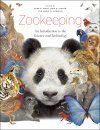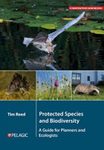Textbook Handbook / Manual
By: Mark D Irwin(Editor), John B Stoner(Editor), Aaron M Cobaugh(Editor)
674 pages, 85 b/w photos, 55 b/w illustrations, 48 tables
![Zookeeping Zookeeping]()
Click to have a closer look
About this book
Contents
Customer reviews
Biography
Related titles
About this book
Zookeepers are responsible for the care and welfare of animals in zoos and aquariums and also serve as public ambassadors for the animals. As species extinction, environmental protection, animal rights, and workplace safety issues come to the fore, zoos and aquariums need keepers who have the technical expertise and scientific knowledge to keep animals healthy, educate the public, and create regional, national, and global conservation and management communities.
Zookeeping: An Introduction to the Science and Technology offers a comprehensive and practical overview of the profession geared toward new animal keepers and anyone who needs a foundational account of the topics most important to the day-to-day care of zoo and aquarium animals. The editors, all three experienced in zoo animal care and management, have put together a cohesive and broad-ranging book that tackles each of its subjects carefully and thoroughly.
The contributions in Zookeeping: An Introduction to the Science and Technology cover professional zookeeping, evolution of zoos, workplace safety, animal management, taxa-specific animal husbandry, animal behavior, veterinary care, public education and outreach, and conservation science. Using the newest techniques and research gathered from around the world, Zookeeping: An Introduction to the Science and Technology is a progressive textbook that seeks to promote consistency and the highest standards within global zoo and aquarium operations.
Contents
Preface
Part One: Professional Zookeeping
1. The Profession of Zookeeper
2. Professionalism and Career Development
3. Communication and Interpersonal Skills for Keepers
Part Two: Evolution of Zoos
4. Zoo History
5. Today's Zoos
6. Animal Ethics and Welfare
Part Three: Workplace Safety and Emergencies
7. Workplace Safety
8. Emergency Readiness and Crisis Management
9. Basic First Aid
Part Four: Zoo Animal Management
10. Daily Routine and Basic Husbandry
11. Taxonomy
12. Anatomy and Physiology (Part 1: Invertebrates)
13. Anatomy and Physiology (Part 2: Vertebrates)
14. Stress and Distress
15. Physical Restraint and Handling
16. Nutrition
17. Recordkeeping
18. Identification
19. Reproduction
20. Population Management
21. Management of Neonatal Mammals
22. Management of Geriatric Animals
23. Transportation and Shipping
24. Exhibit Design
25. Zoo Horticulture
Part Five: Zoo Animal Husbandry and Care
26. Husbandry and Care of Small Mammals
27. Husbandry and Care of Hoofstock
28. Husbandry and Care of Carnivores
29. Husbandry and Care of Primates
30. Husbandry and Care of Elephants
31. Husbandry and Care of Marine Mammals
32. Husbandry and Care of Birds
33. Husbandry and Care of Reptiles
34. Husbandry and Care of Amphibians
35. Aquarium Science: Husbandry and Care of Fishes and Aquatic Invertebrates
36. Husbandry and Care of Terrestrial Invertebrates
Part Six: Animal Behavior, Enrichment, and Training
37. Introduction to Animal Behavior
38. Applied Animal Behavior
39. Animal Behavioral Concerns
40. Enrichment
41. Enrichment Programs
42. Operant Conditioning
43. Husbandry Training
Part Seven: Veterinary Care
44. Principles of Animal Health
45. Veterinary Care and Technology
46. Zoonotic Disease
47. Preventive Medicine
48. Veterinary Diagnostics
49. Medications and Dose Calculations
50. Chemical Restraint
Part Eight: Education, Outreach, and Public Interaction
51. Educating Entertainingly: Basic Interpretation
52. Pubhc Relations in Zoos and Aquariums
Part Nine: Conservation Science
53. Conservation Biology
54. Research in Zoos
55. Cooperative Science Programs
56. Going "Green" in the Workplace
57. Wildlife Rehabilitation
Part Ten: Government and Legislation
58. Introduction to Regulation of Zoos and Aquariums
59. CITES and lATA
60. Government and Legislation in Africa
61. Government and Legislation in Asia
62. Government and Legislation in Australia
63. Government and Legislation in Canada
64. Government and Legislation in Europe
65. Government and Legislation in New Zealand
66. Government and Legislation in the United States
Acknowledgments
Appendix 1: Further Readings
Appendix 2: Recommended Web Links
Appendix 3: Professional Colleges and Universities in the United States
Glossary
List of Contributors
Index
Customer Reviews
Biography
Mark D. Irwin is a licensed veterinarian and associate professor who leads the Zoo Technology program at Jefferson Community College, SUNY, in Watertown, NY, where he trains future zookeepers.
John B. Stoner has decades of experience in zoo animal care as a keeper and animal care manager at the Toronto Zoo and is an adjunct faculty member of Sheridan College in Brampton, Ontario, where he teaches exotic animal science.
Aaron M. Cobaugh is associate professor and coordinator of the Animal Management program at Niagara County Community College, SUNY, in Sanborn, NY, where he teaches zoo-related courses that train future zookeepers, and is a former keeper himself.
Textbook Handbook / Manual
By: Mark D Irwin(Editor), John B Stoner(Editor), Aaron M Cobaugh(Editor)
674 pages, 85 b/w photos, 55 b/w illustrations, 48 tables
"Zookeeping is destined to become the 'must have' comprehensive resource for the zoo industry. It offers an abundance of information and knowledge for the novice zookeeper and the seasoned veteran alike. From the history of zoos to animal welfare, training, husbandry, and beyond – to the future of the zoological institution – as we know it. Zookeeping covers it all, replacing dozens of single-subject books. The contributors are among the most respected and recognized zoo experts, and they include nearly every conceivable subject of interest to those in the field."
- International Conference of Zookeepers
"Zoos and aquariums may vary in size and design, but what should always remain consistent is the quality of animal care. Zookeeping will contribute greatly to the professional development of new animal care professionals by providing core information and best practices, helping to develop and enhance keeper knowledge at the entry level. Mark Irwin, his colleagues, and more than seventy contributors have made a great contribution to fundamental animal care. The American Association of Zoo Keepers is proud to include this volume as part of its standardized instruction for the professional development of animal care professionals."
- Bob Cisneros, American Association of Zoo Keepers
"Initially, Zookeeping was meant to be for zookeepers only. The final product, however, is probably the most comprehensive guide to what you should know about running a good zoo business ever published. Animals are at the center of this book: it is about their care and conservation. For that purpose, top experts from the zoo business provide insight into animal husbandry, diseases, behavior, taxonomy, the legal situation, conservation, and international cooperation – to name just a few subjects. All those issues make a modern zoo and help preserve biodiversity worldwide."
- Gerald Dick, World Association of Zoos and Aquariums







































